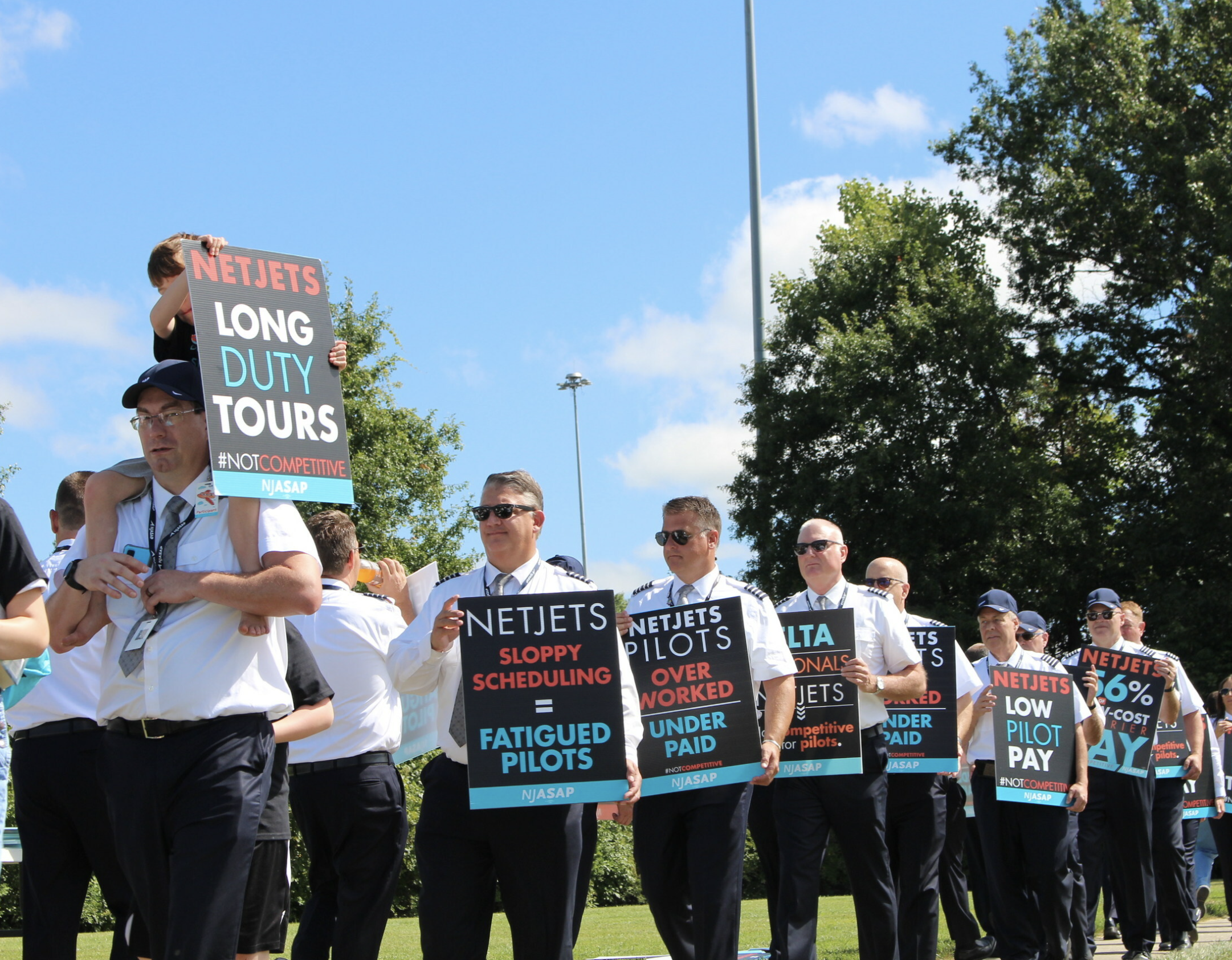Will pilots at NetJets approve the contract offer agreed in principle last Friday between management and NJASAP, their union?
A Chat GPT analysis of more than 100 comments from social media boards used by NetJets pilots assessed, “The sentiment expressed in these comments is predominantly negative, with frustration, disappointment, and anger being common themes.”
It continues, “There’s a sense of suspicion and distrust towards the company’s motives for terminating profit sharing, with an emphasis on transparency issues.”
According to Chat GPT, posters are “critical of both the company’s decision and the union’s perceived lack of assertiveness from the union…Comments express disillusionment with the negotiation process, dissatisfaction with the proposed deals, and skepticism about the effectiveness of the union’s actions.”
The AI analysis says, “There’s a pervasive feeling of resentment towards management, with some commenters expressing a desire to see the company suffer consequences for its actions. Overall, the sentiment can be described as highly negative and indicative of significant discontentment among the workforce.”
NetJets pilots speak out
Overall, the social media messages varied quite a bit.
One poster, Pervis, wrote, “Big NO here.”
Another that goes by ZebraSpots added, “This (Agreement In Principle) is a waste of time to even consider. Not worth the time to even consider. garbage.”
JTF560 posted, “If we do vote it down, it will be super ugly times. Leadership says it will be nuclear and that management won’t offer anything again for a long time. Most of the No voters believe we somehow will have the unity to force something much better quickly.”
GeeWizDriver added, “The only conceivable reason for an AIP this bad is to have it fail by a wide margin in the hopes of sending a louder message. You either haven’t been reading the statements by the negotiating committee members, or you have no ability to read between the lines…Anybody that votes for this POS doesn’t have the intellect to operate an airplane.”
Others had more moderate perspectives.
MinRest posted, “For NJASAP to present this shows that they believe this is all they could get, and it really shows how powerless they really are. It will probably pass, too.”
Longlive727 posted, “My take: What leverage do we have? Airplanes haven’t been parked. New hire classes are full. Picket attendance is dwindling. If this is voted down, why would management come back to the table?”
SWABJH wrote, “Under this contract, I would conservatively be making $400k/year and working half the month. Could I make more by working more? Yes. Could I also make more by going to an airline? Yes. However, at what point is it enough?”
PointBreak noted, “Like any proposal, I’m sure it’s lacking, but over a 50 percent pay raise in base salary in six years isn’t exactly what I would call an L.
NetJets’ pilot attrition
Much of NJASAP’s leverage is based on its belief that a flood of pilots are getting ready to exit the world’s largest private jet flight provider for more pay at big airlines such as American Airlines, United Air Lines, Delta Air Lines, and Southwest Airlines.
NJASAP said a survey late last year revealed 40% of members “expect to leave the company within a year” if they don’t achieve a new contract.
Last year, the big players agreed to record pay deals with pilots as they sought to staff back up after the Covid shutdowns.
However, NetJets has said attrition is not an issue.
It claims turnover rates “remain below the national average.”
For the 12 months ending November 30, 2023, NetJets had a turnover rate of 7.3% when only considering voluntary, non-retirement separations.
While “a post-pandemic hiring boom at the airlines did prompt a slight increase in turnover,” the company says it only lost “213 of more than 3,000 pilots departing in 2023 as voluntary, non-retirement separations.”
NetJets has offered a 52.5% increase in compensation over six years.
The current contract runs through the end of 2027, with a management option to extend the contract through the end of 2029.
Is the pilot shortage over?
Some say the pilot shortage has ebbed.
Brian Sumers, Editor of The Airline Observer, tells Private Jet Card Comparisons, “On the recent round of U.S. airline earnings calls, some airline executives said they’re having less trouble finding pilots.”
He adds, “Frontier, in particular, said it has seen less pilot attrition recently. Frontier CEO Barry Biffle also noted that U.S. regionals are beginning to fly more capacity, which he said probably means they’re having less trouble finding and retaining pilots. Sun Country CEO Jude Bricker has also told me he’s having no trouble finding new pilots. Sun Country has, however, had some difficulty in persuading first officers to become captains.”
Sumers notes, “We have also seen some airlines slow – or stop – their pilot hiring. Delta will hire half as many pilots this year as last. Spirit late last year said it was pausing its pilot hiring. And on the cargo side, UPS last year offered buyouts to pilots. To be sure, there is still a tight labor market for pilots qualified for 121 jobs. But the supply and demand imbalance is not nearly as pronounced as it was a couple of years ago.”
Craig Picken, CEO of executive recruiter Northstar Group and a former sales executive with Bombardier and Gulfstream, says, “I think the NJASAP is playing a dangerous game.”
He adds, “In 2019, Netjets’ pilots ratified their current contract with an overwhelming 81% acceptance rate. In 2021, the deal was enhanced to the ‘strong support of Capt. Pedro Leroux, who is president of NJASAP.'”
Picken says, “In my humble opinion, the pilot shortage is waning: (the) cargo market is down, bizav flying is down, Spirit Airlines’ longevity may be in question, AmeriJet just restructured, and UPS suggested a few hundred of their pilots apply for jobs at (regional airline) PSA.”
He says that if the grass is greener at the Part 121 mainline options, pilots at NetJets could move. “But instead of just quitting and going to the airlines (NetJets) pilots are screaming unfair.”
Negotiating leverage
One NetJets pilot noted that while it will be hard to find fellow aviators to say they voted in favor of the agreement, he expects it to get 70% voting yes.
Still, pilots have leverage.
Sumers says, “As you know, supply and demand is just one piece of the pilot bargaining playbook. Pilots have some leverage on things like safety. Just like 121 pilots, NetJets pilots understand how to use public opinion to their benefit. All this discussion about fatigue and safety probably has some effect, just as it does at Part 121 carriers.”
Last month, NJASAP placed an ad in The Wall Street Journal titled, ‘NetJets Owners: What if you looked at your window and saw a panel of the plane?”
The ad channeled the recent door plug, which blew off an Alaska Airlines Boeing 737.
A press release sent to the media and posted online said the increasingly tense negotiations were putting NetJets’ “sterling safety record at risk.”
NJASAP has been holding pickets since the 2023 Super Bowl.
Industry consultant Rollie Vincent, a veteran of Bombardier, Cessna, and Flexjet notes, says while he is not tracking the specifics of the NetJets-NJASAP contract battle, the big airlines “have raised the bar for the entire industry.”
Earlier today, Georgia Jet, a small operator, said it was pausing its charter business as it cannot find enough pilots.
So far, that doesn’t seem to be the case at NetJets.
In January, it implemented an age 70 mandatory retirement age, which led to a reduction of an estimated 70 pilots.
How will NetJets pilots vote?
What’s next?
NJASAP has only provided members with a term sheet.
It expects to give them a tentative agreement next week, after which a vote would take place.
So how will they vote?
ChatGPT says, “Based on these points, it’s difficult to determine definitively whether the pilots will vote yes or no on the contract offer. It appears to be a contentious issue with differing viewpoints among the pilot group. Ultimately, the outcome of the vote will depend on how the majority of pilots weigh these factors and whether they believe the contract offer meets their needs and expectations.”












